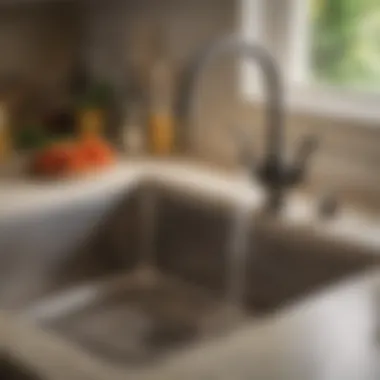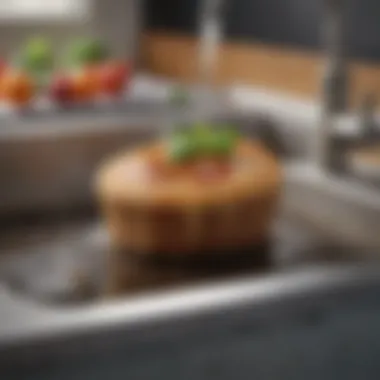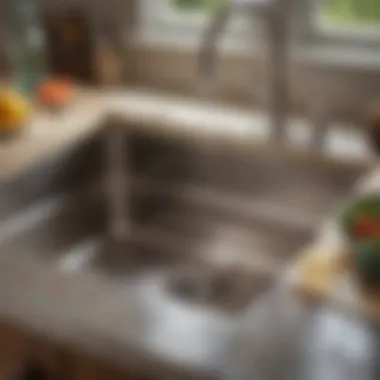Effective Remedies for a Smelly Kitchen Sink Drain


Intro
Unpleasant odors from kitchen sink drains can be a persistent nuisance. They can arise due to various reasons, often involving the buildup of food particles and grease. Gaining insight into these causes is essential to tackle the problem effectively. In this guide, we will explore several remedies ranging from basic household solutions to proactive maintenance tips, empowering you to keep your kitchen environment fresh.
Understanding the source of these odors is vital. Often, food residue, soap scum, and hard water deposits contribute to the development of unpleasant smells. It is not just about treating the symptoms but recognizing and addressing the underlying issues. By applying the knowledge gained here, you promote a clean kitchen space and ensure the longevity and efficiency of your plumbing system.
Understanding Odor Sources
To effectively combat unpleasant odors from kitchen sink drains, one must first understand the sources of these odors. Recognizing the origins can significantly aid in implementing the right solutions. Several issues can lead to smells emanating from a sink, including the buildup of organic materials, problems with the P-trap, and blocked vent pipes. By being aware of these factors, homeowners can take appropriate steps to mitigate future problems and maintain a more pleasant kitchen environment.
Organic Material Buildup
One of the primary reasons for foul odors in kitchen sinks is the accumulation of organic material. Leftover food particles, grease, and soap build-up can create a breeding ground for bacteria and mold. As these organic materials decompose, they release unpleasant odors that can permeate the kitchen. Regularly flushing the drains with hot water can help in minimizing this accumulation.
Consider also using strainers to catch larger particles. Porous materials such as coffee grounds, vegetable scraps, and even small bits of soap can easily find their way down the drain. Once they are there, they can become trapped, leading to further decay and smell.
P-Trap Issues
The P-trap is an essential component of plumbing that prevents sewer gases from entering the home. However, if a P-trap is dry or not functioning correctly, it can fail to serve its purpose, allowing odors to escape. A dry P-trap can occur if a sink is not regularly used. In such cases, it is important to run some water through the sink to refill the trap.
Additionally, clogs in the P-trap can also lead to odors. Regular cleaning and maintenance of this area are necessary. It is advisable to inspect the P-trap and remove any debris that may have built up inside it. This simple measure can significantly improve airflow and odor control in the kitchen sink.
Blocked Vent Pipes
Blocked vent pipes are another factor contributing to unpleasant smells in the kitchen. Vent pipes allow sewer gases to escape outside the home. If these pipes are blocked, it can create a vacuum in the plumbing system, resulting in a backup of gases that may smell. Leaves, debris, or even bird nests can clog these pipes.
It is advisable to regularly check and clean outside vent pipes to ensure that they are unobstructed. If you can't reach them easily, consider consulting a professional who can handle the inspection and cleaning without risk to safety or plumbing system integrity. Keeping vent pipes clear is essential for maintaining a fresh and odor-free kitchen environment.
Immediate Remedies
Boiling Water Treatment
The boiling water treatment is a straightforward yet effective option for addressing drain odor issues. When poured directly into the drain, boiling water can dissolve some of the organic material that may be contributing to unpleasant smells. This method helps to break down greasy debris and food particles, which often become stuck on the walls of the pipes.
- How to perform the boiling water treatment:
- Heat a kettle or pot of water until it reaches a rolling boil.
- Carefully pour the boiling water down the drain in stages, allowing it to work for a few moments before adding more.


The high temperature can also assist in killing bacteria that might linger in the drain, further enhancing its effectiveness. This method is quick and requires no special products, making it a go-to choice for many homeowners. However, care must be taken, as pouring boiling water directly into fragile pipes may lead to damage.
Baking Soda and Vinegar
The combination of baking soda and vinegar is a classic remedy for many cleaning problems, including smelly drains. Baking soda is a mild abrasive and a natural deodorizer, while vinegar is acidic, which helps to loosen decay and remove odors. This reaction not only cleans the drain but also neutralizes the odor, making the kitchen smell fresher.
- How to use baking soda and vinegar:
- First, pour half a cup of baking soda down the drain.
- Follow that with half a cup of vinegar.
- Allow the mixture to fizz for about 10 to 15 minutes.
- Finally, flush the drain with hot water.
This method is safe for most types of plumbing and yields immediate results. It’s an eco-friendly approach, avoiding harsh chemicals that may not only be harmful but can also damage pipes in the long run.
Commercial Drain Cleaners
For those situations where home remedies do not resolve the odor issue, commercial drain cleaners can be a viable option. These products contain stronger chemicals designed to break down tough clogs and dislodge debris that may not respond to simpler methods. They can quickly eliminate odors right at the source, providing immediate relief.
- Considerations for using commercial cleaners:
- Read the label carefully to ensure it is compatible with your plumbing.
- Follow the manufacturer’s instructions for safe and effective use.
- Be cautious about overuse, as excessive use can lead to pipe damage or environmental harm.
While commercial drain cleaners can provide effective results, they should be used judiciously. Rely on them as a last resort, keeping in mind the potential impact on both plumbing and health.
Preventive Measures
Addressing odors from kitchen sink drains involves recognizing that prevention is often more effective than treatment. Implementing preventive measures helps safeguard your kitchen from unpleasant smells and reduces the frequency of deep cleaning tasks. By maintaining a clean and efficient drainage system, you can enjoy a more pleasant cooking and dining environment. Here, we will explore specific elements that contribute to effective preventive maintenance, emphasizing their benefits and considerations.
Regular Cleaning Schedule
Establishing a regular cleaning schedule is essential for minimizing odors from your kitchen sink. This routine should include simple tasks, such as rinsing the sink with hot water daily, which can help to dissolve food particles and grease. Moreover, consider dedicating time weekly to scrub the sink and the surrounding areas. Use mild soap and a sponge to remove any build-up that may linger.
Having a systematic approach can keep the sink area fresh. You can create a schedule that suits your lifestyle. For example, consider cleaning every Saturday morning, or align it with garbage disposal checks. Consistency is key; it prevents the organic material from accumulating over time. Regular cleaning not only keeps odors at bay but also ensures that your sink remains sanitary and visually appealing.
Proper Waste Disposal Techniques
Enhancing your approaches to proper waste disposal techniques can significantly reduce the occurrence of unpleasant smells in your kitchen. When preparing food, it is vital to properly dispose of waste, rather than letting scraps linger in the sink. Think about using a compost bin for vegetable peelings and other organic waste. This will decrease the volume of waste that enters the drain and ultimately breaks down, causing odors.
Moreover, when washing dishes, ensure that no large food particles are flushed down the drain. Encourage family members or housemates to embrace these practices as part of their cooking habits. By practicing conscientious waste disposal, you are actively working against the build-up of organic material that can cause bad smells in your kitchen sink.


Use of Strainers
Utilizing strainers in your sink can be a simple yet effective way to keep unwanted items from entering your drainage system. Strainers act as a barrier, catching food scraps and debris while allowing water to flow freely through the drain. There are various types of strainers available, from mesh types to those made of stainless steel, each designed for carrying out this essential function.
Placing a strainer over your sink will not only prevent blockages but also reduce the amount of organic matter that can decay and create foul odors. Remember to clean the strainer regularly to prevent it from becoming a source of odor itself. A few minutes each week to rinse it off can make a significant difference in your kitchen’s overall smell. In addition to being practical, strainers are low-cost solutions that can improve the efficiency of your kitchen waste management.
Regular maintenance and preventive measures are key to ensuring a fresh kitchen environment.
By adopting these preventive strategies, you are investing time in maintaining the functionality of your kitchen sink. The combined efforts of regular cleaning, mindful waste disposal, and the use of strainers will create a robust framework that prevents unpleasant odors, allowing you to enjoy your kitchen without constant worry.
Advanced Solutions
Advanced solutions become essential when simpler remedies fail to eliminate persistent odors from kitchen sink drains. This section focuses on the importance of tackling the issue at a deeper level. Addressing the root causes often leads to more effective and long-lasting results. Ignoring underlying problems may result in recurring odors, which signals substantial plumbing issues requiring immediate attention.
In this section, we will cover two critical subsections: P-Trap Cleaning and Professional Plumbing Services. Both approaches provide the necessary intervention to ensure the integrity of your plumbing system, thus maintaining a pleasant kitchen environment.
P-Trap Cleaning
The P-trap, a curved pipe located under your sink, plays a significant role in maintaining the hygiene of your kitchen. It holds water, creating a barrier that prevents foul odors from entering your kitchen from the sewer. However, food particles, grease, and organic matter can accumulate in this area, leading to unpleasant smells.
Cleaning the P-trap is a straightforward process, but it requires some basic plumbing knowledge.
Here are the steps for effective P-trap cleaning:
- Gather your tools: You will need a bucket to catch any drips, a wrench, and cleaning supplies like a brush and sponge.
- Disconnect the P-trap: Carefully unscrew the connectors with a wrench, ensuring not to damage the pipes. Place the bucket under the trap to catch water.
- Remove built-up debris: Inspect the trap for any sludge or accumulated food waste. Use a brush or sponge to scrub the insides thoroughly.
- Rinse and reassemble: After cleaning, rinse the trap with warm water. Reconnect the pipes securely and check for leaks by running some water through the sink.
Regular P-trap cleaning can help prevent unpleasant odors and keep your plumbing functioning optimally. Consider doing this as part of your preventive maintenance routine.
Professional Plumbing Services
Sometimes, the odors from your kitchen sink drain may be too persistent for DIY methods. In such cases, enlisting professional plumbing services can be the best course of action. Expert plumbers can diagnose issues beyond the P-trap, such as blocked vent pipes or significant buildup further down the drainage system.
When to consider professional help includes:
- Persistent foul odors that do not improve with home remedies.
- Frequent clogs that are difficult to resolve.
- Signs of leaks in the plumbing system.
"Plumbing issues are best addressed early to prevent larger problems in the future."


Professional plumbers utilize specialized tools and techniques to resolve complex drainage issues efficiently. They can also provide guidance on maintaining your system to avoid future problems. Investing in professional services not only addresses immediate odors but also enhances the overall health of your kitchen plumbing.
Common Mistakes to Avoid
In addressing the issue of a smelly kitchen sink drain, being aware of common mistakes can significantly enhance effectiveness of remedies. Many individuals, while trying to solve odor issues, might inadvertently worsen the problem or create new ones. Understanding these pitfalls is essential in maintaining a functional and pleasant kitchen environment.
Ignoring Warning Signs
Ignoring the initial signs of an odor can lead to more serious issues over time. When a kitchen sink drain begins to emit unpleasant smells, it is often the first indication of underlying problems. These could range from simple organic material buildup to more complex plumbing issues.
By disregarding these warning signals, one risks letting issues fester, leading to clogs or more challenging repairs down the line. It’s vital to address smells promptly. This can save time and expense in the long run.
Using Harsh Chemicals
Many people resort to harsh chemicals for drain cleaning. Products like sulfuric acid and bleach may offer a quick fix, but they can also be detrimental. These chemicals can erode pipes, particularly in older plumbing systems. Over time, this corrosion can cause leaks and further damage.
Moreover, strong chemicals can be harmful to the environment. They can disrupt the natural balance of beneficial bacteria in wastewater systems. Instead, consider natural alternatives first. Solutions such as baking soda and vinegar can effectively clean and deodorize the drain without the risks associated with harsh chemicals.
Neglecting the Garbage Disposal
Neglecting the garbage disposal aspect can also contribute to drain odors. Often, food particles become trapped in the disposal, leading to bacteria growth. This can stink up both the disposal and the kitchen sink.
To prevent this, proper use and cleaning of the garbage disposal is essential. Regularly running the disposal with cold water can help ensure food waste is efficiently processed. Additionally, periodic cleaning using ice cubes and rock salt can help eliminate stuck food particles, further preventing odors from developing.
Important Note: Addressing odors promptly and carefully will enhance the kitchen experience and prolong the lifespan of your plumbing system.
Keeping these mistakes in mind will help maintain a cleaner, fresher kitchen sink drain. Regular attention to these areas ensures a more sanitary food preparation environment, benefiting the overall cooking experience.
Closure
Maintaining a fresh and pleasant kitchen environment is crucial for any home, especially for those who love cooking or entertaining guests. In this article, we have discussed various remedies for dealing with the unpleasant odors that can arise from kitchen sink drains. These remedies range from immediate solutions such as boiling water and using baking soda, to advanced options like cleaning the P-trap or seeking professional plumbing services.
Summary of Remedies
The key remedies explored include using common household items like boiling water, which effectively dissolves grease and food residues accumulated in the pipes. Baking soda and vinegar create a chemical reaction that can help dislodge buildup while also neutralizing odors. In more severe cases, commercial drain cleaners present options that offer quick fixes, although caution is required due to their chemical nature.
Preventive measures were also highlighted, underscoring the importance of regular maintenance to avoid recurring issues. Creating a cleaning schedule, disposing of waste properly, and using strainers are practical steps to minimize the risk of a smelly drain.
Importance of Maintenance
Ignoring maintenance can lead to more significant problems down the line. A smelly kitchen sink drain often signals underlying issues that require attention. Regular maintenance not only helps in mitigating odors but also prolongs the life of plumbing systems. By adopting a proactive approach, homeowners can maintain optimal drainage and a more inviting kitchen atmosphere. Furthermore, addressing these problems promptly can prevent potential costly repairs or replacements in the future.
"An ounce of prevention is worth a pound of cure."
This adage rings true in the context of kitchen hygiene. Just a little vigilance regarding cleaning can save homeowners from future headaches and expenses.















